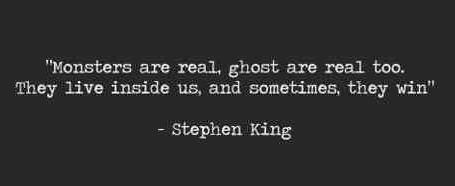I thought I'd try something a little different with today's blog post and I may turn it into a regular feature: My Favorite Writers & What They Taught Me. See? I even made a logo for it ...
 |
| I'm sure you're in awe of my mad Photoshop skillz. |
Raum asked me about my favorite authors in one of her columns, and what I had learned from their work. I said, "The best writers are bibliophiles. As our mind devours each page, we're also learning the way to present a scene, to build up tension or foreshadow. Each writer has their own unique "voice", but just like a baby learning to talk, we learn by experiencing the voices of others."
I thought I'd discuss a few of those writers I mentioned and what I learned from them. The first author I mentioned was Stephen King, who seems a good choice for my inaugural column on this subject, as he is a writer with whom most people are familiar.
I read a lot of Stephen King when I was young. My mother is a fan of horror/dystopian novels and so the latest Stephen King novel was likely to find its way to our home quickly. The only works of his that I've never read are his Dark Tower series and Eye of the Dragon, and my mom hasn't yet loaned me her copy of the JFK novel.
King made a big impression on me, and I'm not just talking about the nightmares brought on by It.
| As if Tim Curry wasn't scary enough already ... |
King has a reputation, as he somewhat inelegantly puts it, of "having diarrhea of the word processor." Some people mournfully posit that he's not as good as he once was, but really, he's been known as a under-edited "hack" for his entire career. But then again, so was this guy:
 |
| Ever read/seen Titus Andronicus? |
There were a few things I gathered from King as a writer:
He could create an entire character using only a few words. A good example of this may be the character of Dodie Eberheart from The Dark Half. Don't remember her? Probably not. She was only in the story for one chapter, but he somehow managed to create a vibrant character, complete with back-story, in just a small handful of pages.
This particular line always stuck with me:
[W]hen Dodie Eberhart raised her voice to its maximum decibel level, windows cracked, the eardrums of small children ruptured, and dogs fell dead.It's the traditional King tongue-in-cheek humor, probably emphasized by the hint of alliteration, but it's a rich and colorful image.
 |
| Not that kind of colorful, but I didn't want to look for "ruptured eardrum" or "dead dog" images. |
The next passage illustrates two things I also assimilated from King: the way he writes chpaters from an animal's perspective and his invention of words. Here, a ghost is trying to convince Horace, the dog, to take to his owner, Julia, an envelope that has fallen behind the sofa. Horace is distracted by the popcorn he finds back there.
Julia would never eat anything that had been in his mouth, Horace knew this from long experience. Even if he pushed it out with his snout she wouldn't eat it. It was peoplefood, yes, but now it was also floorfood.
| "Aw, man, you know the human is going to throw that perfectly good hotdog in the trash!" |
Two new words in the space of just a paragraph!
Those of you who have read my story The Better Angels of Our Nature may remember the passages written from the puppy, Dave's, perspective.
The winged-man had told him they were going to defend their territory from other humans that Dave thought of as baddogs, a terrible term that made him quail when he heard it applied to him, the worst thing he could think of to call them. The baddogs wanted to take the winged-man's female.[...]
They began to open the smaller dens and pull out the pieces of flatfur that humans put on over their hairless skin. Dave growled deep in his throat at the way they threw around his humans' things; and they didn't even run to fetch them, so what was the point? One of the baddogs must have heard it even though humans were mostly deaf. (They barely had a sense of smell either; Dave wondered how they managed to navigate the world.)[...]
Forlorn at having to abandon his den, Dave searched the soil for the scent of the winged-man in ever-widening circles until he found it. His tail wagged in delight. He followed it; the winged-man and his mate had walked this way relatively recently. It was a long walk and rather frightening as large roaring beasts which smelled like burning and had sunshine eyes ran at him. Dave dodged many of them on his way and they did not chase after him.It was a very entertaining writing exercise, to try to write from Dave's perspective, to define objects through his eyes, to interpret actions as he would see them. How does a dog think? Certainly not as we do. When we think of a dog's actions, we tend to define it from a human perspective. "He's jealous," or "He's feeling guilty." Well, if a dog could narrate, wouldn't they define our actions from a canine perspective? He would likely pity us for our dull senses and see our trips to the grocery store as successful hunting missions and our interactions with other humans as a struggle for pack dominance. King set me on the path of wondering about these things, and in playing with the English language to create new "dog words."
King also has a knack for describing how ordinary people would react to extraordinary circumstances. This passage is from The Moving Finger, one of the stories in Nightmares and Dreamscapes:
A finger had poked its way out of the drain-hole in the basin.
A human finger.
For a moment it froze, as if aware it had been discovered. Then it began to move again, feeling its wormlike way around the pink porcelain. It reached the white rubber plug, felt its way over it, then descended to the porcelain again. The scratching noise hadn't been made by the tiny claws of a mouse after all. It was the nail on the end of that finger, tapping the porcelain as it circled and circled.
Howard gave voice to a rusty, bewildered scream, dropped the broom, and ran for the bathroom door. He hit the tile wall with his shoulder instead, rebounded, and tried again. This time he got out, swept the door shut behind him, and only stood there with his back pressed against it, breathing hard. His heartbeat was hard, toneless Morse code high up in one side of his throat.
In this story, Howard never discovers what the finger is doing in his drain. The story is mainly concerned with his bewilderment and reaction to the scenario. He tries to explain it away, tries to convince himself he didn't see it, but ultimately brings himself around to the conclusion he must combat it. It's the slow transformation from disbelief to terror which makes this tale so compelling.
Stephen King once said that many of his stories begin with the simple thought, "What would happen if ..." He's made me think along the same lines.




Between the pic of Tatertot and thinking about a wondering finger, I'm never sleeping tonight. Thanks!
ReplyDeleteWriting can be a door to another dimension or a painful slog through blah, blah, blah. Your writing is always the former and never disappoints.
That's the thing that sucks about having a fertile imagination: HORRIFIC nightmares.
DeleteI'm afraid I must correct an error. The dog is Sam, not Tatertot. Tatertot was his girlfriend. Almost, but not quite, as ugly as Sam.
DeleteGreat post! Stephen King does certainly have a way with words and I love how he builds suspense....
ReplyDeleteI believe that every writer has something to teach us, even if it's merely what NOT to do. (I won't be covering any of the Don't-Be-That-Guy authors, but I'm sure you know what I mean.)
Delete